小升初英语专项训练-时态综合训练
- 格式:doc
- 大小:47.50 KB
- 文档页数:2

小升初英语时态综合总复习训练题附参考答案及解析一、单选题(共 27 小题)1、The Whites _____________ many places of interest since they came to China.A、have visitedB、will visitC、visitedD、visit2、— Is that Jack speaking?— Sorry, he isn't in right now. He _ the cinema with his aunt.A、has been toB、has gone toC、have been toD、have gone to3、— How many friends ______________you got?— Four.A、doB、willC、areD、have4、--What if you don't finish your work on time? -- Mrs. Brown will be very angry.A、happensB、is happenedC、happenedD、will happen5、Some people were _________ the river in a boat.A、 crossedB、 crossingC、 crosingD、 crosses6、He ________ cereal for breakfast yesterday.( )A、haveB、ateC、makes7、I _____ my hat yesterday.( )A、forgetB、forgotC、to forget8、Long ago, a little baby ____ born. ( )A、wereB、wasC、is9、Yesterday we ____ a lot of Christmas gifts.( )A、buyB、boughtC、buying10、A woman ________ to the store and ________ a dress.( )A、went; buyB、goes; buyC、went; boughtD、go; buy11、Jenny ____ cereal for breakfast yesterday. ( )A、ateB、eatC、eating12、Santa ____ them gifts yesterday. ( )B、broughtC、to bring13、He ____ people to love each other. ( )A、taughtB、teachC、teaching14、Yesterday we ____ gifts,( )A、boughtB、buyC、to buy15、I _______ home to China next week.A、flyB、will flyC、fly toD、fly for16、I ______________ go to the market (市场) to buy some fruit. ( )A、amB、isD、will17、I ____ 12 years old next year.( )A、amB、will beC、wasD、is18、Uncle Li ____ learn English next year.( )A、isB、going toC、is goD、is going to19、What are you going to _____________next week? ( )A、doB、didC、doesD、doing20、Jenny ____ cereal for breakfast yesterday.( )A、eatB、ateC、eats21、Kim ____ her father wash the dishes.( )A、helpB、helpsC、help to22、She ____ to learn English. ( )A、wantB、wantesC、wants23、It ____ her name on it!( )A、hasB、haveC、haven't24、They are ____ the newspaper.( )A、readB、to readC、reading25、She is _____ home now.A、going toB、go toC、going26、Mum is _____ eggs.A、cookB、cookingC、to cook27、Are they _____ cards? ( )A、playsB、playingC、played二、填空题(共 3 小题)1、用所给单词的适当形式填空。
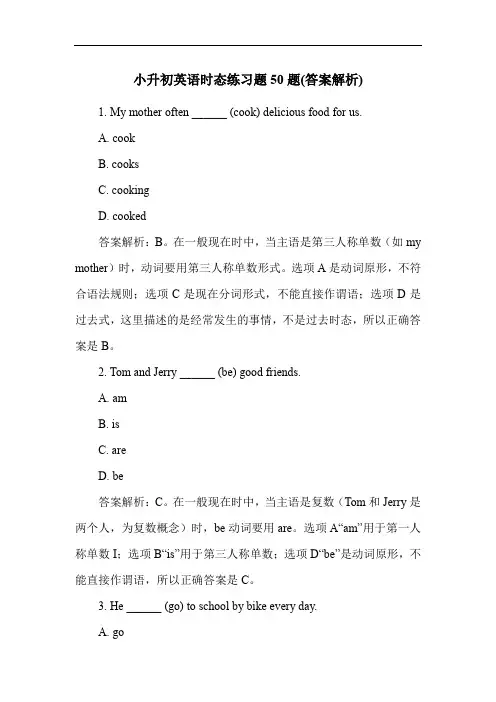
小升初英语时态练习题50题(答案解析)1. My mother often ______ (cook) delicious food for us.A. cookB. cooksC. cookingD. cooked答案解析:B。
在一般现在时中,当主语是第三人称单数( 如my mother)时,动词要用第三人称单数形式。
选项A是动词原形,不符合语法规则;选项C是现在分词形式,不能直接作谓语;选项D是过去式,这里描述的是经常发生的事情,不是过去时态,所以正确答案是B。
2. Tom and Jerry ______ (be) good friends.A. amB. isC. areD. be答案解析:C。
在一般现在时中,当主语是复数(Tom和Jerry是两个人,为复数概念)时,be动词要用are。
选项A“am”用于第一人称单数I;选项B“is”用于第三人称单数;选项D“be”是动词原形,不能直接作谓语,所以正确答案是C。
3. He ______ (go) to school by bike every day.A. goB. goesC. goingD. gone答案解析:B。
一般现在时中,主语he是第三人称单数,动词go 要变为goes。
选项A是动词原形,不符合要求;选项C是现在分词形式,不能单独作谓语;选项D是过去分词,这里不是过去时态,所以正确答案是B。
4. We ______ (have) English classes on Mondays.A. haveB. hasC. havingD. had答案解析:A。
一般现在时中,主语we是第一人称复数,动词用原形。
选项B“has”是第三人称单数形式的动词;选项C“having”是现在分词形式,不能作谓语;选项D“had”是过去式,这里是一般现在时,所以正确答案是A。
5. She ______ (like) reading books in the library.A. likeB. likesC. likedD. liking答案解析:B。
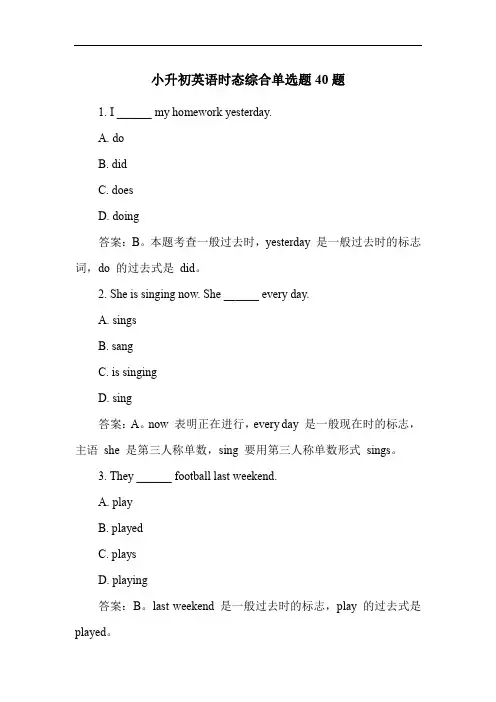
小升初英语时态综合单选题40题1. I ______ my homework yesterday.A. doB. didC. doesD. doing答案:B。
本题考查一般过去时,yesterday 是一般过去时的标志词,do 的过去式是did。
2. She is singing now. She ______ every day.A. singsB. sangC. is singingD. sing答案:A。
now 表明正在进行,every day 是一般现在时的标志,主语she 是第三人称单数,sing 要用第三人称单数形式sings。
3. They ______ football last weekend.A. playB. playedC. playsD. playing答案:B。
last weekend 是一般过去时的标志,play 的过去式是played。
4. We ______ going to have a picnic tomorrow.A. amB. isC. areD. be答案:C。
be going to 表示将来,we 是复数,be 动词用are。
5. Look! The girls ______ in the park.A. danceB. dancesC. are dancingD. danced答案:C。
Look 是现在进行时的标志,主语是girls,be 动词用are,dance 要用现在分词dancing。
6. He ______ English for three years.A. learnsB. learnedC. has learnedD. is learning答案:C。
for three years 是现在完成时的标志,结构是have/has + 过去分词,he 是第三人称单数,用has learned。
7. I ______ the book yet.A. haven't readB. didn't readC. won't readD. don't read答案:A。
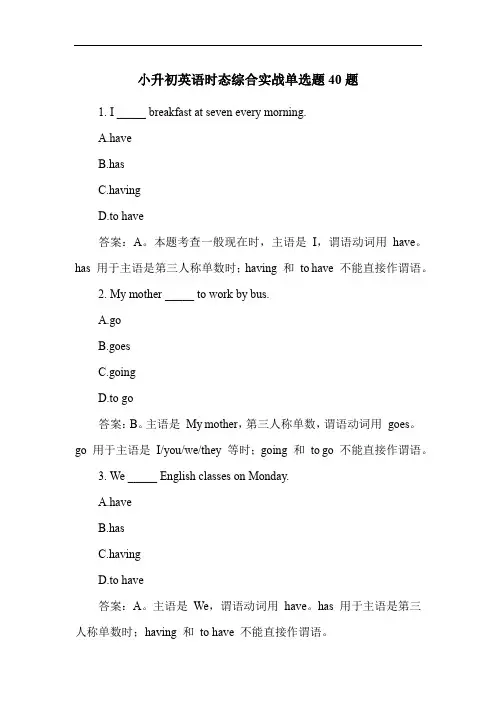
小升初英语时态综合实战单选题40题1. I _____ breakfast at seven every morning.A.haveB.hasC.havingD.to have答案:A。
本题考查一般现在时,主语是I,谓语动词用have。
has 用于主语是第三人称单数时;having 和to have 不能直接作谓语。
2. My mother _____ to work by bus.A.goB.goesC.goingD.to go答案:B。
主语是My mother,第三人称单数,谓语动词用goes。
go 用于主语是I/you/we/they 等时;going 和to go 不能直接作谓语。
3. We _____ English classes on Monday.A.haveB.hasC.havingD.to have答案:A。
主语是We,谓语动词用have。
has 用于主语是第三人称单数时;having 和to have 不能直接作谓语。
4. The sun _____ in the east.A.riseB.risesC.risingD.to rise答案:B。
主语是The sun,第三人称单数,谓语动词用rises。
rise 用于主语是I/you/we/they 等时;rising 和to rise 不能直接作谓语。
5. He _____ sports every day.A.playB.playsC.playingD.to play答案:B。
主语是He,第三人称单数,谓语动词用plays。
play 用于主语是I/you/we/they 等时;playing 和to play 不能直接作谓语。
6.She ______ a book yesterday.A.readB.readsC.is readingD.will read答案:A。
本题考查一般过去时,yesterday 是一般过去时的标志词,read 的过去式是read。
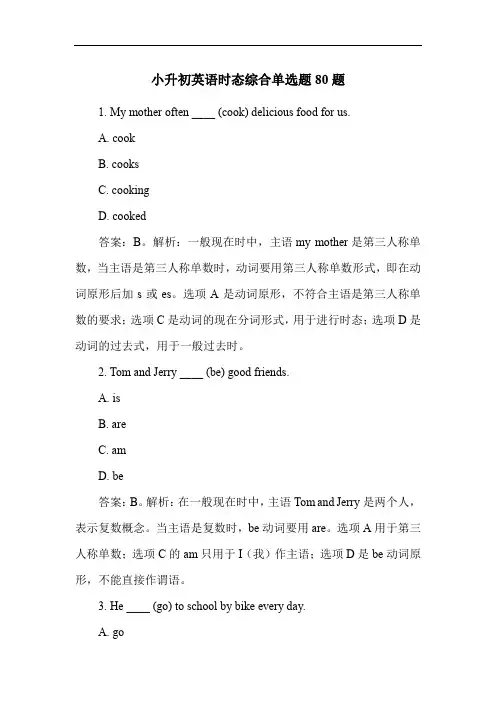
小升初英语时态综合单选题80题1. My mother often ____ (cook) delicious food for us.A. cookB. cooksC. cookingD. cooked答案:B。
解析:一般现在时中,主语my mother是第三人称单数,当主语是第三人称单数时,动词要用第三人称单数形式,即在动词原形后加s或es。
选项A是动词原形,不符合主语是第三人称单数的要求;选项C是动词的现在分词形式,用于进行时态;选项D是动词的过去式,用于一般过去时。
2. Tom and Jerry ____ (be) good friends.A. isB. areC. amD. be答案:B。
解析:在一般现在时中,主语Tom and Jerry是两个人,表示复数概念。
当主语是复数时,be动词要用are。
选项A用于第三人称单数;选项C的am只用于I( 我)作主语;选项D是be动词原形,不能直接作谓语。
3. He ____ (go) to school by bike every day.A. goB. goesC. wentD. going答案:B。
解析:一般现在时中,主语he是第三人称单数,动词go要变成goes。
选项A是动词原形,不符合主语为第三人称单数的情况;选项C是go的过去式,用于一般过去时;选项D是go的现在分词,用于进行时态。
4. We usually ____ (have) English classes in the morning.A. haveB. hasC. hadD. having答案:A。
解析:在一般现在时中,主语we是第一人称复数,动词用原形。
选项B是第三人称单数形式,不符合主语we;选项C是have的过去式,用于一般过去时;选项D是have的现在分词,用于进行时态。
5. My sister ____ (like) reading books.A. likeB. likesC. likedD. liking答案:B。
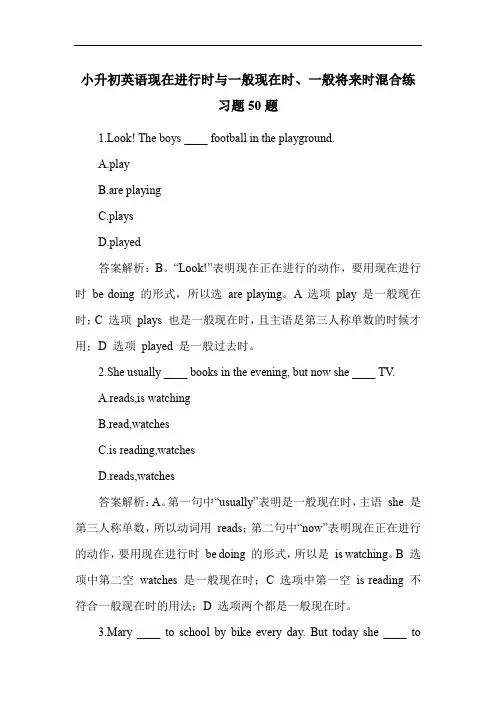
小升初英语现在进行时与一般现在时、一般将来时混合练习题50题1.Look! The boys ____ football in the playground.A.playB.are playingC.playsD.played答案解析:B。
“Look!”表明现在正在进行的动作,要用现在进行时be doing 的形式,所以选are playing。
A 选项play 是一般现在时;C 选项plays 也是一般现在时,且主语是第三人称单数的时候才用;D 选项played 是一般过去时。
2.She usually ____ books in the evening, but now she ____ TV.A.reads,is watchingB.read,watchesC.is reading,watchesD.reads,watches答案解析:A。
第一句中“usually”表明是一般现在时,主语she 是第三人称单数,所以动词用reads;第二句中“now”表明现在正在进行的动作,要用现在进行时be doing 的形式,所以是is watching。
B 选项中第二空watches 是一般现在时;C 选项中第一空is reading 不符合一般现在时的用法;D 选项两个都是一般现在时。
3.Mary ____ to school by bike every day. But today she ____ toschool on foot.A.goes,is goingB.go,is goingC.goes,goesD.is going,goes答案解析:A。
第一句中“every day”表明是一般现在时,主语Mary 是第三人称单数,所以动词用goes;第二句中“today”且表示与平常不同的方式,要用现在进行时be doing 的形式表示将来的计划,所以是is going。
B 选项第一空go 不符合第三人称单数的用法;C 选项第二空goes 不是现在进行时;D 选项顺序错误。
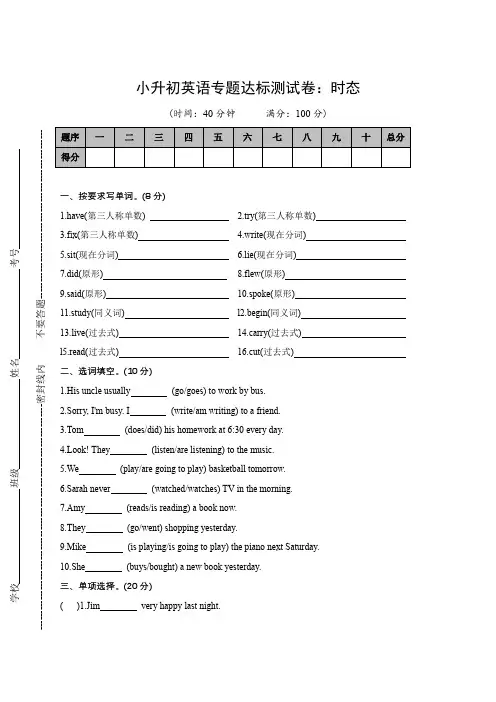
小升初英语专题达标测试卷:时态(时间:40分钟满分:100分)一、按要求写单词。
(8分)1.have(第三人称单数)2.try(第三人称单数)3.fix(第三人称单数)4.write(现在分词)5.sit(现在分词)6.lie(现在分词)7.did(原形) 8.flew(原形)9.said(原形) 10.spoke(原形)11.study(同义词) l2.begin(同义词)13.live(过去式) 14.carry(过去式)l5.read(过去式) 16.cut(过去式)二、选词填空。
(10分)1.His uncle usually (go/goes) to work by bus.2.Sorry, I'm busy. I (write/am writing) to a friend.3.Tom (does/did) his homework at 6:30 every day.4.Look! They (listen/are listening) to the music.5.We (play/are going to play) basketball tomorrow.6.Sarah never (watched/watches) TV in the morning.7.Amy (reads/is reading) a book now.8.They (go/went) shopping yesterday.9.Mike (is playing/is going to play) the piano next Saturday.10.She (buys/bought) a new book yesterday.三、单项选择。
(20分)( )1.Jim very happy last night.A.isB.looksC.was( )2.She to school at 7:00 every day, but yesterday she to school at 7:20.A.goes;goesB.goes;wentC.went;went( )3.Tom a basketball match tomorrow.A.watchesB.watchedC.will watch( )4.We football next Sunday.A.playB.playedC.are going to play( )5.Look! The bus .A.is comingesC.came( )6.Our English teacher an English book now.A.readsB.readC.is reading( )7.--What's Amy doing?--She's in the classroom.A.singingB.singsC.sang( )8.My father often toy cars for us.A.madeB.is makingC.makes( )9.--How he go to work?--He to work by bike.A.does;goB.do;goesC.does; goes( )l0.Mr Green usually newspapers in the evening, but he and his wife television yesterday evening.A.reads;watchesB.reads;is going to watchC.reads;watched四、用所给单词的适当形式填空。
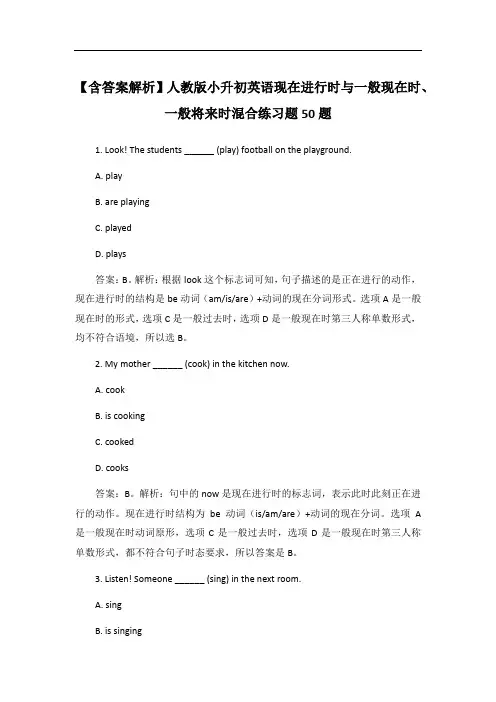
【含答案解析】人教版小升初英语现在进行时与一般现在时、一般将来时混合练习题50题1. Look! The students ______ (play) football on the playground.A. playB. are playingC. playedD. plays答案:B。
解析:根据look这个标志词可知,句子描述的是正在进行的动作,现在进行时的结构是be动词(am/is/are)+动词的现在分词形式。
选项A是一般现在时的形式,选项C是一般过去时,选项D是一般现在时第三人称单数形式,均不符合语境,所以选B。
2. My mother ______ (cook) in the kitchen now.A. cookB. is cookingC. cookedD. cooks答案:B。
解析:句中的now是现在进行时的标志词,表示此时此刻正在进行的动作。
现在进行时结构为be动词(is/am/are)+动词的现在分词。
选项A是一般现在时动词原形,选项C是一般过去时,选项D是一般现在时第三人称单数形式,都不符合句子时态要求,所以答案是B。
3. Listen! Someone ______ (sing) in the next room.A. singB. is singingC. sangD. sings答案:B。
解析:listen这个词表明动作正在进行,是现在进行时的标志。
现在进行时的构成是be动词(am/is/are)+动词的现在分词形式。
选项A是动词原形,用于一般现在时非第三人称单数情况;选项C是一般过去时;选项D是一般现在时第三人称单数形式,都不符合句子要求,所以选B。
4. Tom ______ (do) his homework at the moment.A. doB. is doingC. didD. does答案:B。
解析:at the moment表示此刻、现在,是现在进行时的标志。
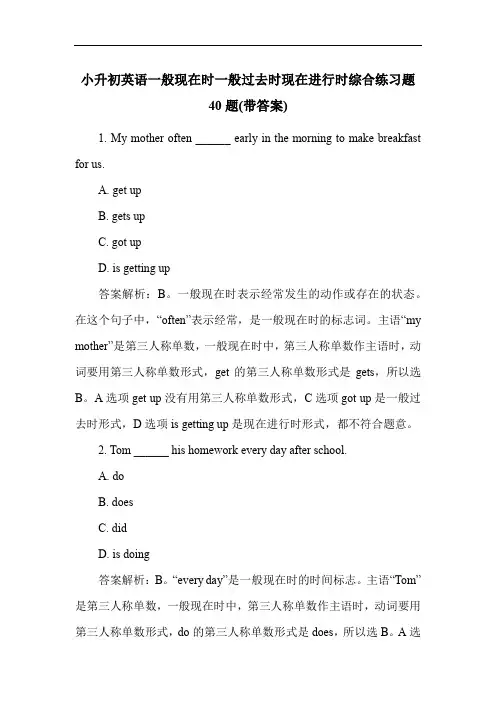
小升初英语一般现在时一般过去时现在进行时综合练习题40题(带答案)1. My mother often ______ early in the morning to make breakfast for us.A. get upB. gets upC. got upD. is getting up答案解析:B。
一般现在时表示经常发生的动作或存在的状态。
在这个句子中,“often”表示经常,是一般现在时的标志词。
主语“my mother”是第三人称单数,一般现在时中,第三人称单数作主语时,动词要用第三人称单数形式,get的第三人称单数形式是gets,所以选B。
A选项get up没有用第三人称单数形式,C选项got up是一般过去时形式,D选项is getting up是现在进行时形式,都不符合题意。
2. Tom ______ his homework every day after school.A. doB. doesC. didD. is doing答案解析:B。
“every day”是一般现在时的时间标志。
主语“Tom”是第三人称单数,一般现在时中,第三人称单数作主语时,动词要用第三人称单数形式,do的第三人称单数形式是does,所以选B。
A选项do没有用第三人称单数形式,C选项did是一般过去时形式,D选项is doing是现在进行时形式,均不符合要求。
3. There ______ some milk in the fridge.A. isB. areC. wasD. were答案解析:A。
一般现在时描述现在存在的状态。
“milk”是不可数名词,在一般现在时中,不可数名词作主语时,be动词用is,所以选A。
B选项are用于复数名词,C选项was是一般过去时中is的过去式,用于单数可数名词或不可数名词的过去情况,D选项were是一般过去时中are的过去式,用于复数名词的过去情况,均不符合题意。
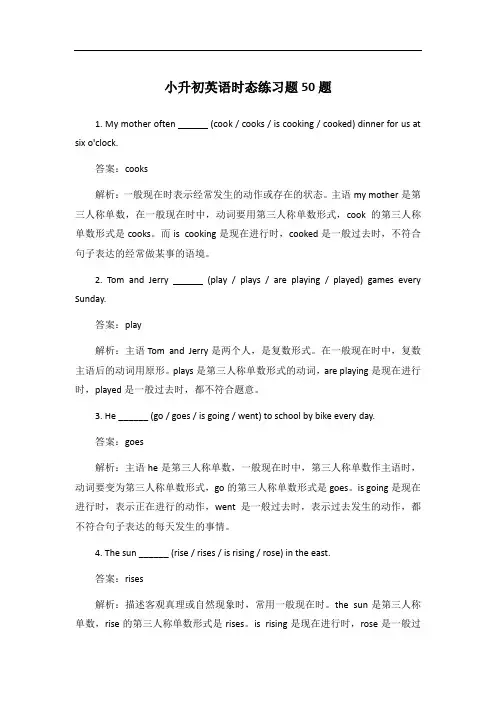
小升初英语时态练习题50题1. My mother often ______ (cook / cooks / is cooking / cooked) dinner for us at six o'clock.答案:cooks解析:一般现在时表示经常发生的动作或存在的状态。
主语my mother是第三人称单数,在一般现在时中,动词要用第三人称单数形式,cook的第三人称单数形式是cooks。
而is cooking是现在进行时,cooked是一般过去时,不符合句子表达的经常做某事的语境。
2. Tom and Jerry ______ (play / plays / are playing / played) games every Sunday.答案:play解析:主语Tom and Jerry是两个人,是复数形式。
在一般现在时中,复数主语后的动词用原形。
plays是第三人称单数形式的动词,are playing是现在进行时,played是一般过去时,都不符合题意。
3. He ______ (go / goes / is going / went) to school by bike every day.答案:goes解析:主语he是第三人称单数,一般现在时中,第三人称单数作主语时,动词要变为第三人称单数形式,go的第三人称单数形式是goes。
is going是现在进行时,表示正在进行的动作,went是一般过去时,表示过去发生的动作,都不符合句子表达的每天发生的事情。
4. The sun ______ (rise / rises / is rising / rose) in the east.答案:rises解析:描述客观真理或自然现象时,常用一般现在时。
the sun是第三人称单数,rise的第三人称单数形式是rises。
is rising是现在进行时,rose是一般过去时,不符合描述客观真理的语境。
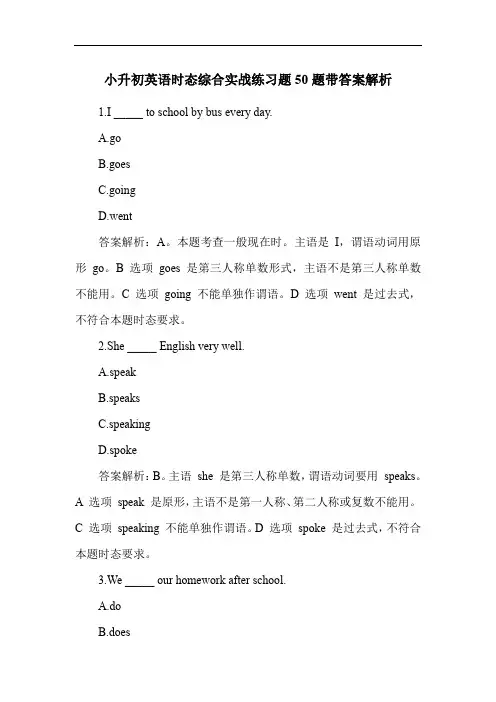
小升初英语时态综合实战练习题50题带答案解析1.I _____ to school by bus every day.A.goB.goesC.goingD.went答案解析:A。
本题考查一般现在时。
主语是I,谓语动词用原形go。
B 选项goes 是第三人称单数形式,主语不是第三人称单数不能用。
C 选项going 不能单独作谓语。
D 选项went 是过去式,不符合本题时态要求。
2.She _____ English very well.A.speakB.speaksC.speakingD.spoke答案解析:B。
主语she 是第三人称单数,谓语动词要用speaks。
A 选项speak 是原形,主语不是第一人称、第二人称或复数不能用。
C 选项speaking 不能单独作谓语。
D 选项spoke 是过去式,不符合本题时态要求。
3.We _____ our homework after school.A.doB.doesD.did答案解析:A。
主语we 是复数,谓语动词用原形do。
B 选项does 是第三人称单数形式,不符合。
C 选项doing 不能单独作谓语。
D 选项did 是过去式,不符合本题时态要求。
4.My brother _____ football on Sundays.A.playB.playsC.playingD.played答案解析:B。
主语my brother 是第三人称单数,谓语动词用plays。
A 选项play 是原形,不符合。
C 选项playing 不能单独作谓语。
D 选项played 是过去式,不符合本题时态要求。
5.They _____ to music in their free time.A.listenB.listensC.listeningD.listened答案解析:A。
主语they 是复数,谓语动词用原形listen。
B 选项listens 是第三人称单数形式,不符合。
2023-2023小升初专项训练感慨句基础题一、选择题1. ______a great post office!A.wha...B.Wha.....C.How2. ______a great museum!A. WhatB. WhereC. How3. _________beautiful she looks!A.Wha...B.Wha...C.How4. _______beautiful flowers!A. What aB. WhatC. How5. _______big map!A.Wha...B.What’....C.Wha.a6. __________ a good boy!A.Ho....B.Wh....C.Wha...7. _______ fat I am !A.Wher...B.Wh...C.How8. --_________.today.-Yes.Shal.w.hav..picni.i.th.ope.air?A.Wha.fin.weathe.i.........B.Ho.fin.weathe.i.isC.Wha..fin.weathe.i.i......D.Ho.fin.th.weathe.is9. _______ weather we are having these days!A.Wha..ba.B.Ho.nic..C.Ho.nic.D.Wha.bad10. ________ lovely little rabbit!A.Wha...B.Ho..C.Wha...11. ______ fast I am!A.Wha....B.Wha.....C.How12. —________ ¬¬today!.Yes.Shal.w.hav..picni.i.the.ope.air?A.Wha.fin.weathe.is.........B.Ho.fin.weathe.i.isC.Wha..fin.weathe.i.is.....D.Ho.fin.th.weathe.is13. _______beautiful the flowers are!A.Ho........B.WhatC.Ho........D.Wha..14.—_______.today..Yes.Shal.w.hav..picni.i.th.ope.air?A.Wha.fin.weathe.i.......B.Ho.fin.weathe.i.isC.Wha..fin.weathe.i.i.....D.Ho.fin.th.weathe.is15. ()________a big map of the US!A.Wher..B.Wha..C.When16. from Beijing to London!A.How long way it isB.What a long way is itA.How long way is it D.What a long way i t is17. ______ a nice radio!A.Ho......B.Wha.......C.What’s18. 在每年的9月10日那天, 你应当对老师说:A.Happ.birthda.t.you!B.Happ.Children'.Day!C. Happy Teachers' Day!19. ___________a beautiful flower!A.Ho.B.Wha.C.Where20. a special day!A.Wher....B.Wha......C.ItD.which二、填空题21. 填入适当的词完毕下列感慨句。
小升初英语时态综合实战练习题50题带答案1. My sister often ______ to school by bike.A. goB. goesC. goingD. went答案解析:B。
本题考查一般现在时的用法,主语my sister是第三人称单数,在一般现在时中,第三人称单数作主语时,动词要用第三人称单数形式,go的第三人称单数形式是goes。
选项A是动词原形,用于第一、二人称和复数主语;选项C是现在分词形式,不能单独作谓语;选项D是一般过去式,不符合句子时态。
2. Tom and Jerry ______ their homework every day.A. doB. doesC. didD. are doing答案解析:A。
这里的主语是Tom和Jerry,是两个人,表示复数概念。
在一般现在时中,复数主语后的动词用原形。
选项B是第三人称单数形式的动词,用于单数主语;选项C是一般过去式,与句子的时态不符;选项D是现在进行时的结构,而句子表达的是每天的习惯性动作,是一般现在时。
3. Our school ______ at eight o'clock in the morning.A. startB. startsC. startingD. started答案解析:B。
主语our school是第三人称单数,一般现在时中,第三人称单数作主语时,动词要用第三人称单数形式,start的第三人称单数形式是starts。
选项A是动词原形,用于第一、二人称和复数主语;选项C是现在分词形式,不能单独作谓语;选项D是一般过去式,不符合句子时态。
4. She ______ English very well.A. speakB. speaksC. speakingD. spoke答案解析:B。
主语she是第三人称单数,在一般现在时中,第三人称单数作主语时,动词要用第三人称单数形式,speak的第三人称单数形式是speaks。
人教版小升初英语一般将来时、现在进行时与一般现在时混合练习题20题含答案解析1. My mother ______ dinner every day, but today she ______ lunch.A. cooks; is cookingB. is cooking; cooksC. cooks; cooksD. is cooking; is cooking答案解析:A。
一般现在时表示经常发生的动作或存在的状态,“My mother cooks dinner every day”表示妈妈每天做晚饭,这是一个经常的行为,用一般现在时。
现在进行时表示此时此刻正在进行的动作,“but today she is cooking lunch”,今天她正在做午饭,强调此时此刻正在做这个动作。
B选项时态使用错误;C选项第二个空时态错误;D选项第一个空时态错误。
2. Tom ______ to the park tomorrow. He ______ there every week.A. will go; goesB. goes; will goC. will go; will goD. goes; goes答案解析:A。
一般将来时表示将来某个时间要发生的动作,“Tom will go to the park tomorrow”,明天汤姆将去公园。
一般现在时表示经常发生的动作,“He goes there every week”,他每周都去那里。
B选项时态顺序错误;C选项第二个空时态错误;D选项第一个空时态错误。
3. Look! The boys ______ football on the playground. They ______ football every afternoon.A. are playing; playB. play; are playingC. are playing; are playingD. play; play答案解析:A。
小升初英语时态综合实战练习题50题(带答案)1. I ______ my homework yesterday.A. doB. didC. doesD. doing答案:B。
本题考查一般过去时,yesterday 是一般过去时的标志词,do 的过去式是did,A 选项do 是一般现在时,C 选项does 是一般现在时第三人称单数形式,D 选项doing 是现在分词,不符合句子时态,所以选B。
2. We often ______ football after school.A. playB. playedC. playsD. playing答案:A。
本题考查一般现在时,often 是一般现在时的标志词,we 是复数主语,其后接动词原形,B 选项played 是过去式,C 选项plays 是第三人称单数形式,D 选项playing 是现在分词,所以选A。
3. My sister ______ to school by bus every day.A. goB. goesC. wentD. going答案:B。
本题考查一般现在时,every day 是一般现在时的标志词,my sister 是第三人称单数,其后接动词第三人称单数形式,A 选项go 是动词原形,C 选项went 是过去式,D 选项going 是现在分词,所以选B。
4. They ______ a party last week.A. haveB. hadC. hasD. having答案:B。
本题考查一般过去时,last week 是一般过去时的标志词,have 的过去式是had,A 选项have 是一般现在时,C 选项has 是第三人称单数形式,D 选项having 是现在分词,所以选B。
5. My mother ______ the dishes every morning.A. washB. washesC. washedD. washing答案:B。
小升初英语语法专项提优卷-四大时态混合运用学校:__________姓名:__________班级:__________考号:__________一、选择题1.Look! Robin is ______ like an elephant. ()A.walk B.walking C.walked2.David is ______ America. ()A.visiting B.visit C.visited D.visits 3.Look at the black clouds in the sky. It ______. ()A.rains B.is going to rain C.rained 4.—When _____ the party_____? ()—At 4: 00 tomorrow afternoon.A.does; end B.did; end C.will; end 5.Where _____ Lily and her cousin yesterday evening? () A.was B.were C.did6.—My sister and I ______ going to make a card for Mum on Mothers’ Day. ()—You’re so sweet.A.is B.am C.are7.—_____ your sister busy yesterday? ()—Yes, _____.A.Did; she did B.Were; she was C.Was; she was 8.Who _____ over there now? ()A.sing B.are sing C.is singing9.My father _____ a book _____ me yesterday. ()A.buy; for B.buys; to C.bought; for10.______ a concert next Saturday. ( )A.There will be B.Will there be C.There can be二、单词拼写三、根据首字母及汉语提示完成句子词语:___________________________________________________________句子:___________________________________________________________ ___________________________________________________________六、句型转换1.She speaks Chinese in class. (改为一般过去时)She Chinese in class.七、匹配题A.B.C.D.E.1.Please show us your left arm. ( )2.My uncle always works on the computer at home. ( ) 3.Kim often reads books after school in the afternoon. ( ) 4.I’d like some bread, eggs and milk for breakfast. ( ) 5.Dear Santa, I want a dress and a schoolbag. Thank you. ( )八、翻译题九、补全对话/短文1.—What’s Mary doing?— .2.—What do you often do on the weekend?— .3.—What can you do for the party?— .4.—What did Wu Yifan do last Sunday?— .5.—What are you going to do tomorrow?— .十、阅读理解Do you know what the White House is? Perhaps some of you do, while others don’t.The White House is a house in Washington D.C.The president of the USA works in it. It is really white. But do you know why the White House is white?The story happened in 1812. That year England was at war (与……交战) with America, the British army (军队) got to Washington and set thepresident’s house on fire.In 1814, in order to hide the marks of the fire, the stone walls of the president’s house were painted white and it has been the “White House” ever since.1.The White House is ______. ()A.a house for the president of the USA B.a house for American peopleC.a house for American soldiers D.one of the American museums 2.In ______ American people painted the president’s house white. () A.1810B.1812C.1814D.1816 3.The house is called “White House” because ______. () A.the house is very clean B.the stone walls of the house are whiteC.the American people like white colour D.it is covered with snow 4.In the passage “set...on fire” means “______” in Chinese. () A.放火烧B.解雇C.开火D.把……放在火上5.The Chinese for “the White House” is “______”. ()A.白房B.白殿C.怀特•豪斯D.白宫十一、书面表达寒假快要到了,同学们都有哪些安排呢赶快写一写吧!下面的词可能会帮助到你哦!例如:plan, watch cartoons, play with, do shopping, watch a film, do houseworkMy winter holiday___________________________________________________________ ___________________________________________________________ ___________________________________________________________ ___________________________________________________________ ___________________________________________________________ ___________________________________________________________ ___________________________________________________________参考答案:一、1.B 2.A 3.B 4.C 5.B 6.C 7.C 8.C 9.C 10.A二、1.reading 2.that 3.these 4.taking 5.watches 6.swimming7.skipping 8.riding 9.talking 10.running三、1.watched/atched 2.woke/oke 3.taught/aught 4.works 5.went四、1.swimming 2.is singing 3.were 4.is 5.lives 6.am7.were五、sunny,cloudy It's sunny in Beijing.六、1.spoke 2.is writing 3.am 4.What 5.What is七、1.C 2.B 3.D 4.E 5.A八、1.six dinner2.season summer3.tomatoes table4.often bus5.Here are Thank6.have a look you are7.Here is九、1.She is dancing. 2.I often clean my room. 3.I can sing English songs. 4.He took pictures of the flowers. 5.I am going to playping-pong tomorrow.十、1.A 2.C 3.B 4.A 5.D十一、例文:My winter holidayWe are going to have the winter holiday. I think everybody will do a lot of things in winter holiday. And I have a good plan for my holiday. I will spend a lot of time on my homework. And I am going to play with my friends. I am going to watch a film with my father and mother. And my best friend Lucy will do some shopping with her mother. And we are going to help our mother do。
六年级英语小升初语法易错动词四大时态综合训练卷班级: 姓名: 得分:一、基础训练1.[基础]按要求写出下列单词的正确形式。
(1) is(过去式) (9) do(三单)(2) like(三单) (10) swim(现在分词)(3) study(过去式) (11) play(过去式)(4) see(现在分词) (12) can(过去式)(5) think(过去式) (13) go(过去式)(6) buy(过去式) (14) dish(三单)(7) wash(三单) (15) have(现在分词)(8) run(三单)2.[be动词]用be动词的正确形式填空。
(1)I from China, But my friends, Lily and Lucy, from America.(2) It sunny today, but it was rainy yesterday. Tomorrow, it will snowy(3) My parents young twenty years ago. Now, they old. But I love them.(4)I active now. But three years ago, I very shy.(5)I want to a teacher, because my parents both teachers.(6)—— Jack from Beijing? ——No, he3.[助动词、情态动词]用do或will 的正确形式填空。
(1) What your brother do at weekends?——He plays basketball with his friends.(2) What you do last Sunday? ——I visited the Great Wall(3) When you go to London? ——Tomorrow morning.(4) you your homework yesterday? ——Yes, I(5) you go to the cinema with me next Sunday?——No, I4.[应用]用所给词的适当形式填空。
小学英语时态综合训练一、用动词的正确形式填空1. I ________ (do) my homework every evening.2. We _______ (fly) kites in the park on Sundays.3. My mother ________ (clean) our room on Sundays.4. Tom _______(play) the piano every Saturday. Now he______ (play).5. She _______(like) swimming. She ______ (swim) this weekend.6. Usually my mother _______(wash) the dishes after lunch. But my grandma ______ (wash) today.7. Look at the man! He ______ (read) a magazine.8. Look! The plane ________ (fly) over the building.9. Listen! My aunt ________ (sing) in the room.She is a singer. She _____ (like) singing. She _______(have) a music show. She is excited.10. Tom and Mike always ______ (swim) in the river. They _____ (swim) in the swimming pool this Sunday. Look! They ______ (swim).11. What ______ you usually ______ (do) in the evening?I _______ (play) computer games.12. What _______ you _______ (do) now?I _______ (make) a paper plane.13. What _______ he _______ (do)?He ______ (dance).14. What _______ she ______ (do) yesterday?She ______ (visit) her grandparents.15. ______ your mother ______ (read) newspaper in the morning?Yes, She ________ .16. _______ you _______ (like) fishing?No, I ______ . I like ______ (swim),but my brother ______ (like).17. How ______ your father _______ (go) to work every day?He ______ (go) by bike. But it’s cold today. He ______ (take) the No.21 bus,, and he _______ (go) to work by taxi yesterday.18. _______ the monkey _______ (like) climbing trees? Yes, it _______ .19. What _______ your father ______ (do) after lunch? He _______ (read) a comicbook. What _____ he _______(do) today? He _______ (clean) the kitchen for my grandma. Look! He (clean).20. ________ you ______ (collect) stamps? Yes. I _______ .________ your brother ______ (collect), too? No, he ________ .二、选择题1. _____ he _____ to the park at 6:30 in the morning? No,he _____ .A. Does; goes; doesB. Does; go; doesn’tC. Does; go; does2. What colour _____ you _____ this bookcase? I _____ it pink.A. are; going to paint; am going to paintB. do; paint; paintC. did; paint; painted3. Tim always _____ a picture at home. He _____ a car now.A. draws; is drawingB. draw; drawC. draws; draw4. She usually _____ her friends. They often _____ tea.A. see; drinkB. sees; drinksC. sees; drink5. He usually _____ the dishes at night, but tonight he _____ clothes.A. wash; washB.washes; is going to washC. is washing; washes6. Mr. Green usually _____ his newspaper in the evening, but he and his wife _____ television yesterday evening.A.reads; watchesB.reads; is going to watchC.reads; watched7. Where are the man and the woman? They _____ near the tree.A. sitB. satC. are sitting8. _____ your pen pal _____ diving? No, he _____ .He ______ writing stories.A. Does; like; doesn’t; likesB. Does; likes; doesn’t; likeC. Do; like; don’t; likes9. _____ you _____ fishing yesterday? No, we _____ .A. Does; go; doesn’tB. Did; go; didn’tC. Do; go; don’t10. Open the window, Please. Look! He _____ it.A. opensB. is openningC. is opening11. I usually _____ some milk every day. But I _____ coffee yesterday.A. drink; drankB. is drinking; drinkC. drank; am drinking12. Mr. Green often _____ his newspapers at night. But he _____ an interesting book tonight.A. reads; readsB. reads; readC. reads; is going to read13. The old man _____ playing sports in the park. He _____ morning exercise now.A. likes; is doingB. likes; doesC. like; doing14. What _____ you usually _____ in the evening? I ______ computer games.What _____ you _____ last night? I _____ a book.A. do; do; playB. did; do; playedC. does; do; playsdid; do; read do; do; read do; do; am reading15. Where ______ the boy _____ ? He _____ across the river now.A. does; swim; swimsB. is; swimming; is swimmingD. is; swimming; is swimming16. _____ you _____ to music now? Yes, we _____ .A. Do; listen; doB. Did; listen; didC. Are; listening; are17. Put on you coat, please. OK. I ______ it on.A. am puttingB. am going to putC. put18. _____ you ______ coffee? Yes, I ______ .A. Do; like; doB. Did; like; didC. Are; like; am19. Look! Two cats ______ across the wall.A. runB. runsC. are running20. She _____ tea, but he _____ .A. likes; doesn’t B; like; don’t C. like; doesn’t。